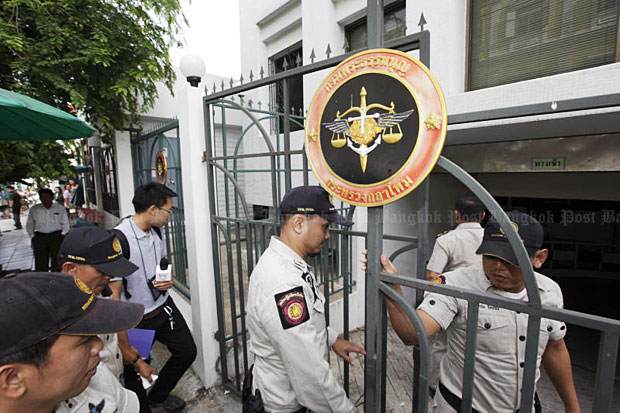
The United Nations’ human rights agency said Tuesday it is “appalled” by jail terms dispensed under the country’s lese majeste law and urged Thailand to amend the “vague and broad” statute to bring it in line with international standards.
Ravina Shamdasani, spokeswoman for the UN High Commissioner for Human Rights, decried the "shockingly disproportionate prison terms handed down over the past few months in lese-majeste cases."
On 7 August, the Bangkok Military Court sentenced travel agent Phongsak Sribunpeng to 30 years in prison for violating Section 112 of the Criminal Code by posting six comments on Facebook critical of the Royal Family.
The sentence was initially 60 years -- 10 years for each post he shared, but did not write -- but was reduced by half after he confessed.
On the same day, the Chiang Mai Military Court dished out a 28-year sentence to Sasiwimol Patomwongfa-ngarm, a hotel employee, for posting seven comments on Facebook critical of the monarchy. The sentence was reduced from 56 years because of her guilty plea.
Another lengthy sentence was set out in March, when the Bangkok Military Court convicted Thiansutham Suttijitseranee to 25 years in prison for posting five comments criticising the monarchy on Facebook.
"These are the heaviest sentences we have recorded since 2006, when we began documenting cases of individuals prosecuted for lese majeste offences for exercising the right to freedom of expression," said the UN's statement issued in Geneva.
And there has been a sharp increase in the number of such cases. Since the May 2014 military coup, at least 40 individuals have either been convicted or remain in pre-trial detention for lese majeste offences, both under Section 112 and under the 2007 Computer Crimes Act, the spokeswoman said.
In early May 2014, prior to the coup, there were five people in prison for lese majeste-related convictions.
Also among those convicted in recent months are people with psycho-social disabilities, Ms Shamdasani said.
On Aug 6, the Chiang Rai military court sentenced Samak Pantae to five years in prison for destroying a portrait of the King while he was intoxicated. Samak had been diagnosed with psychosis by Chiang Rai Hospital and has been taking medication to battle visual and auditory hallucinations.
On June 25, the Bangkok Criminal Court sentenced Tanet Nontakoat to three years and four months in prison for sending links to pages containing alleged lese majeste content to a website administrator. Tanet was reportedly suffering from schizophrenia.
"We are also alarmed at the spike in harsh prison terms delivered in such cases by the military courts, which themselves fail to meet international human rights standards, including the right to a fair trial. Observers have been barred from entry and in many instances there is no option for appeal," she said.
International law requires that trials of civilians by military courts should be exceptional, and military trials must afford all due process guarantees provided for under international human rights law, she noted.
"We call for the immediate release of all those who have been jailed or held in prolonged pre-trial detention for the exercise of their rights to freedom of expression. We also urge the military government to amend the vague and broad lese majeste law to bring it in line with international human rights standards," said the spokeswoman.
This was the latest UN strong statement concerning the lese majeste suits so far.
"Until the law is amended, such laws should not be used arbitrarily to curb debate on critical issues of public interest, even when it involves criticism of heads of state or government," she said.
